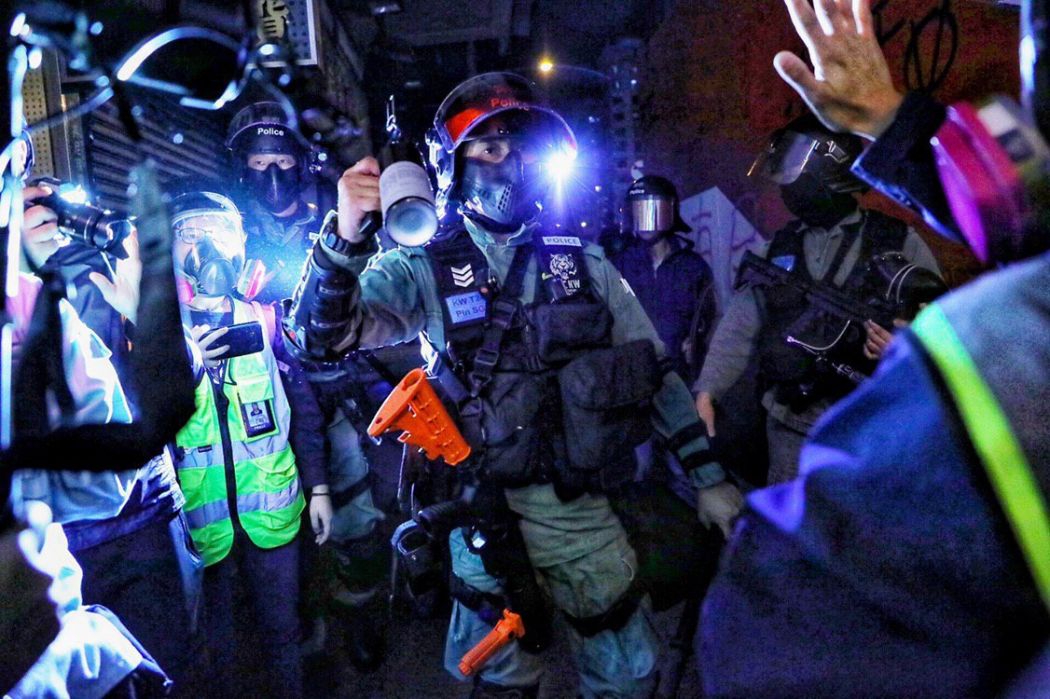By Wilson Leung & Brian Dooley
At the end of November, we warned that Hong Kong was in desperate need of a credible inquiry into police behaviour and that Chief Executive Carrie Lam’s insistence that the Independent Police Complaints Council (IPCC) should undertake the job was a huge mistake.
But here we are now, lumbered with exactly the sort of study that will only make things worse. The IPCC report released last week manages to be simultaneously prolix and superficial. It is clearly an apologia for the police and fails even nominally to demonstrate independence.

The report is one-sided and emotive, and, in many parts, simply wrong. “From early August 2019 onwards,” it claims, “petrol bombs were used at almost every protest, hurled at police officers…”.
This is misleading. Many protests last year proceeded in a peaceful fashion. But even in protests where petrol bombs were used, this generally involved a small minority of demonstrators.
Much of the public’s outrage stems from the fact that the police’s excessive use of force was directed against even peaceful protesters, and other blameless victims such as journalists, medics, bystanders, and human rights observers.
We are far from alone in taking a dim view of the IPCC’s report. NGO Amnesty International denounced the report as “biased,” saying it had “no impartiality” and was an attempt to “whitewash” the police human rights violations.
Professor Clifford Stott of Keele University was part of the international panel of experts appointed last year by the IPCC to advise it. The entire panel dramatically resigned in December over concerns about the “crucial shortfall… in the powers, capacity and independent investigative capability of IPCC.”

After the IPCC report was released last week, Stott noted that the report was missing “key pieces of data.”
Stott also tweeted a quote by George Orwell, accompanied by this comment: “It would seem the release of the IPCC report is part of a wider set of coordinated announcements designed to deliver the new ‘truth’.”
The report’s double standards are dizzying. During the incident in Yuen Long on July 29 last year, in which a white-shirted mob attacked people thought to be pro-democracy protesters, police ignored the public’s emergency calls, appeared to walk away from the scene, shuttered the doors of nearby police stations and even chatted with the white-clad hooligans without making any arrests, despite many of them openly carrying weapons.
The IPCC report justifies the lack of arrests by arguing that the “very tense atmosphere” made it “impractical” for police to make any arrests.
This is highly unconvincing. We have witnessed (both personally and in media footage) many instances of the police charging into large crowds of pro-democracy demonstrators to make arrests – with nary a concern about a “tense” atmosphere.

Chillingly, the IPCC concludes by observing that Hong Kong is “being dragged into an era of terrorism,” echoing comments made recently by Hong Kong and Chinese officials.
It will not be lost on the Hong Kong public that “counter-terrorism” is used by Beijing as an excuse for the horrific internment camps in Xinjiang. The IPCC’s parroting of such language gives little confidence that the IPCC is acting as an independent oversight body.
We are not surprised that the IPCC produced a report like this. It is structurally so flawed that it was never going to be fit for purpose. It never had the powers necessary to compel witnesses to testify, even if it had wanted to.
It also has no ability to mandatorily require the police to hand over documents. To make things worse, the composition of its panel is stacked with pro-government voices. All three of its vice-chairmen are pro-Beijing politicians.
Together with many others, both in Hong Kong and internationally, we had urged the Hong Kong authorities not to do it this way, not to have a process that did not hold the public trust, or one that would only further polarise an already divided society.

We specifically urged the Hong Kong government not to repeat the United Kingdom’s mistake after the “Bloody Sunday” incident in 1972, when British soldiers killed 14 unarmed civil rights protestors in Derry, Northern Ireland.
At that time the British establishment failed spectacularly, establishing a biased inquiry – the infamous Widgery inquiry – that excused the security forces and blamed the protesters.
The Widgery Report destroyed public trust (or what little was remaining by that time) in the British authorities and encouraged more people to turn to violence in exasperation at the authorities’ failure to hold the security forces to account.
The Widgery Report blamed “those who organised the illegal march” for “creating a highly dangerous situation,” and exonerated the killers. It helped propel Northern Ireland into three decades of further widespread violence and bloodshed.
Carrie Lam’s whitewash has now been widely criticised as being the superficial coverup we warned it could be. For us, there is little satisfaction in saying “We told you so.”

What matters is what happens next. The Widgery Report became so widely known as an embarrassing whitewash that the British government was eventually forced to reopen the whole investigation again.
The second time around, it did it properly, appointing an independent panel of international investigators to find the truth. In 2010, the panel concluded that British soldiers had been guilty of killing unarmed protestors. The British Prime Minister formally and publicly apologised to their families, 38 years later. Hong Kong cannot afford to wait that long.
Brian Dooley is a senior advisor at Human Rights First, an international human rights organisation. Wilson Leung is a barrister in Hong Kong and a member of the pro-democracy Progressive Lawyers Group.
